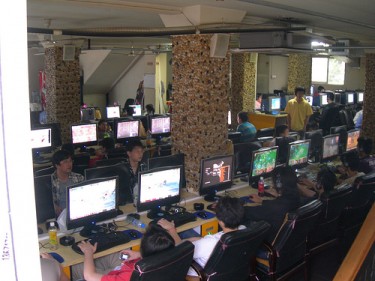News sites, BBSes and microblogs are just a few of the current or past (#fail) parts of the Internet in China which have been slated for one form of real name registration or another.
On July 1, owners of online stores across the country are expected to go real-name, and for China's tens of millions of online gamerz, it was announced last week that as of August 1, registration with a valid resident identity card will be required to get back in the game.
Opposition to the latter plan has been relatively muted in spaces such as comment sections on news stories [zh] carrying the details of the forthcoming regulations and even in forums popular with gamers. Others, however, wonder [zh] if this is the beginning of the end of easy online anonymity in general.

Photo from Daniel Lunsford's Flickr stream
Not Sina.com blogger Mu San; while he predicts problems [zh] with this approach to implementation of real name registration, the potential for privacy violations aside, in his view they won't necessarily have much impact on the end user:
还记得去年出台的“网络防沉迷系统”,但是效果不是很明显。如今网络实名制的到来,真的是万众期待的结果,不过还是褒贬不一!据悉,网络游戏实名制将有三个系统:一是注册系统,玩家需提供身份信息;二是面向社会的查询系统,家长可查询到孩子在玩哪些游戏及在线情况;三是认证系统,与公安部门配合对注册信息进行认证。一旦发现使用虚假身份注册的用户,将会对玩家级别、经验值、道具等清零。不知道这样的政策出台,是好是坏?
家长可以实时监控
根据网络实名制实行的系统准则,除了玩家在注册游戏资料时必须采用真实信息之外,家长还能查看孩子的在线状态。如此一来,家长就可以实时的知道孩子上网的时间,方便监督!既然之前的“防沉迷系统”的宗旨是要求玩家每天连续游戏时间不能超过5小时,那么这个方案就是网游防沉迷的又一道屏障了,不过这只是想到的,实际效果如何还要等实施后才知道。
According to guidelines for implementation of the online real name system, aside from that players, from now on, will be required to provide authentic information when registering for games, parents will also be able to check their children's online status.
As such, parents will be able to know in real time what their children are doing online; what convenient supervision! With the premise of the earlier online game anti-addiction system being that players were kept from gaming for more than five consecutive hours on any day, this new plan is yet another barrier against online game addiction, or at least in theory; as for how effective it proves we'll have to wait until it's been implemented.
信息认证是个难题
实名制势必会遭遇信息认证的难题,不排除有很多未成年的在校学生会趁机借用家长的身份证进行注册,或者更严重的网吧经营人会借成人的身份证帮助这些玩家注册,这样一来就不能达到文化部对网游监管的目的。这只其一,另外,就玩家的虚拟ID和真实个人信息,想在短时间内核实对应起来就不是一件容易办到的事情,要知道中国游戏玩家注册人数可不是一星半点。
目前国内的网游玩家早已超千万,而且还在不断增长中,即使是由玩家自行自觉完成真实信息的填报,也需要工作人员去核实确认,可想进行实名制的工作量之大。而且要求这些信息的真实度更高,就要和公安部联合就身份认证进行确认,而这显然在短时间内完成也是不现实的!
An inevitable problem with a real name system is the challenge in verifying information, and the possibly that minors still in school will use their parents’ IDs to register cannot be excluded, nor can the more serious possibility that Internet cafe management will use adult IDs to help these gamers register. If things proceed as such, the Ministry of Culture's goal of supervising online games will not be achieved. This is just one point, another is that verifying the virtual IDs of these gamers match up with their actual personal information is not something that can be easily done in a short period of time, and it bears pointing out that the number of registered gamers in China would not be a mere trifle.
There are currently far more than ten million gamers in China, and that number continues to grow; even if gamers were sincere and honest in filling out their actual information, people would still be needed to verify it, and you can imagine how much work implementing a real name system would entail. Further, the degree of authenticity of information required is quite high; authenticating it would require working with the Public Security Bureau, so clearly completing this within a short period of time is unrealistic!
个人信息的安全问题谁来保证
实行实名之后信息安全谁来保证,要知道很多玩家的信息都是极具隐私,非常敏感的。表面上实名之后能对盗取账号问题进行一定的遏制,但是不排除一些疯狂盗号的,一旦账号被盗后,如何保证玩家的信息不被泄漏,这是许多玩家都担忧的事情。还有,实名后一旦玩家信息遭到泄露,谁来承担后果呢?是这些网游公司还是盗号人?又或者是提出实施“网络实名制”的人?
Once the real name system is instituted, who would be responsible for keeping the information safe? It goes without saying that a lot of the players’ information is highly private and extremely sensitive. Once the real name system is more or less in place, account theft will to a certain extent be kept in check, but this doesn't exclude the possibility of a targeted attack, and once accounts are stolen, how can it be ensure that players’ information will not be leaked? This is something which concerns many players. Also, in the event that players’ information is leaked following the implementation of the real name system, who will be held responsible? The gaming companies or the ID thieves? Or will it be the people who proposed and implemented this “online real name system”?
可能引发的利益矛盾
还记得去年“防沉迷系统”提出后就已经遭到国内各大网游公司的反对,这也是实施起来困难重重的原因。而且也很难从根本上去做到对网络游戏进行监管,而说到底还是未能从根本上解决游戏公司与玩家权益之间的矛盾。而实名制同样会遇到这样的利益矛盾,眼下游戏群体中大部分都是青少年,如果因为实名注册而离开游戏,这显然不是游戏运营商希望看到的。所以,如果不能解决这个矛盾,网络实名制实施起来,也只是一个嘴上说说的形式,未必会有多大成效的!
I remember that when the online game anti-addiction system [zh] was first proposed, it was met with opposition by all the main mainland gaming companies, this was the reason its implementation faced so many major difficulties. Then there's the fact that carrying out supervision of online games is so difficult logistically, not to mention that the conflict of interest between gaming companies and gamers was never able to be resolved. The real name system will face the exact same conflict of interest: as the majority of gamers are currently youth, having them leave games as a result of real name registration requirements is obviously not something that game operators wish to see. So, if this conflict can't be resolved and implementation of online real name requirements forges ahead, at most it'll only be for appearances, don't expect to see any great results!






